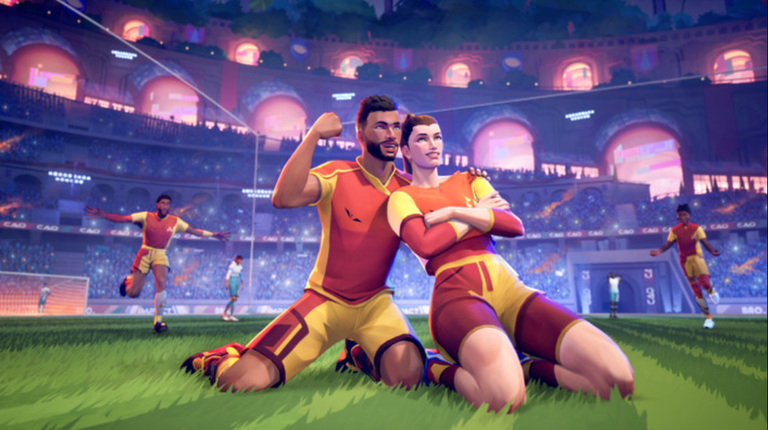From martial arts to football: Slow Club does it again

fuente
Rematch is a very brave game. You can tell from the moment you start the game, and the game doesn't ask you to shoot with a square or a circle. The game aims to be a new proposition, and to achieve its goal, it doesn't mind ignoring the habits and automatisms that players have adopted almost forever.
It's almost common knowledge that to shoot at goal you use a square. If you shoot with a circle, you're either a child or the insufferable friend, but Slow Club wants to change things. They want to differentiate themselves from traditional soccer games, and so they make you shoot with what you shoot in Fortnite: the trigger.
I don't think many of those who watch me know what it feels like to play in a stadium that chants your name. Many won't know how to execute any of the plays Neymar performed, much less have the ability to run for 90 minutes.
Rematch is soccer, but not as we know it. Imagine a mix between Rocket League and a street game without a referee: chaotic, intense, but with surprising tactical acumen. Each player controls a single player in third-person, creating a sense of immersion that traditional games can't achieve. First of all, no more choosing Mbappé so you can run around like a headless chicken in '89. Here, your player's stamina, because you only control one player, is very limited, which will force you to be more careful with the runs you make.
And I'm not talking about college, which is like dropping out of college in the fifth semester. What the hell? Having or not having energy is the difference between a great play in space or losing possession in ridiculous fashion.
Not having much stamina, or, in short, having the lung capacity of a 70-year-old smoker, means you not only ration your energy but also seek advantage through something other than running.
nshot_525.png)
Level playing field that matters
One of Rematch's smartest decisions is its statistical equality. All players have the same capabilities, eliminating the pay-to-win factor that plagues other sports games. This philosophy extends to the entire design. There's no Ultimate Team, no special cards, no temporary boosts. Just pure cosmetics that don't affect performance. It's a breath of fresh air in a genre obsessed with microtransactions.
This means that when a play starts, you don't just have to read the opposing defense, but also try to understand how your teammate thinks, what passing lanes they have open, and when it's best to make a full-speed diagonal run and when your best option is to walk slowly so they can pass you back and be alone in front of the goalkeeper.
This layer of strategy permeates everything we do on the field. The players who best read the game are the ones who will see the greatest rewards when playing, and that rewarding or punishing yourself for your own skill is something that has been largely lost in sports games.

fuente
Conclusion
This title is such a risky game that it's incredible its existence in these times when innovation seems like playing Russian roulette.
But the good people at Slow Club seem to have found an interesting formula. Time, constant updates, and above all, the affection it manages to cultivate in the community are the factors that will determine whether all these virtues truly lead to success or whether this will be just another case of stars that promise to shine brightly and end up fading after a few months.
It's a difficult game to recommend precisely because of how unusual it is and how demanding it ultimately is. However, after just two rounds, you'll be hooked, which is why it's vital to play it in some way.
